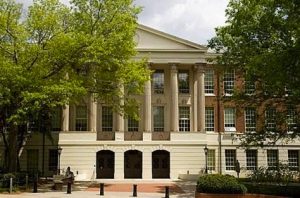By: Khalil Farah
When I tell people my major is Political Science, most immediately assume I am planning for a career in government. In their defense, many of my peers are. The thought of my current generation of Political Science majors as the future of the American government, however, gives me nightmares.
Lets begin by taking a look at the history of Political Studies over the years. The first Western approach to the study of politics comes from, who I like to call, “The Athens Dream Team” of Socrates, Plato and Aristotle. Plato’s Laws and Aristotle’s Politics sought to explain the ideal way to rule one of the city-states of ancient Greece. These works focused on how a ruler justifies their power and how a city is to avoid tyranny. The arguments are made in terms of spiritual ordering. The ruler must always govern the city with the aim of bringing the city as close to the divine concept of Justice as possible.
Eventually, Renaissance scholars revive these ideas and add works of their own. Machiavelli’s Discourses, I maintain, is the greatest Political Science work ever written. The Renaissance laid the foundation for the Enlightenment philosophers of Locke and Hobbes, whose ideas we see at the core of American founding. Famed American historian Arthur M. Schlesinger Jr. wrote that America’s founders were successful because they were intellectually “steeped in the classics” of antiquity. When I was reading the debate that took place at the Constitutional convention, I was struck by how the arguments between the delegates resonate with the Platonic tradition of governance.
The study of politics, then, had previously been a humanistic study. It focused on making sure the students of politics understood the spiritual and secular consequences of ruling, for those in charge but also for the citizens. Here at the University of Georgia, our founding charter declares: “it should therefore be among the first objects of those who wish well to the national prosperity… to place the youth under the forming hand of Society that by instruction they may be molded to the love of Virtue and good Order.” Abraham Baldwin, after which the Political Science building is named, wrote this statement and yet future politicians are no longer taught love of “Virtue and good Order” but rather are taught mathematical evaluative skills and research techniques.
The focus of political studies changed in the 20th century. Starting in the 1950s, universities began to shift to an observational method with analytical aims. The name “Political Science” came into being with the implication that it was now a social science rather than a humanistic study. This trend was furthered by the advent of deductive game theory techniques. By the ‘70s, Political Science was almost entirely driven by statistical studies on group political behavior. As more of the curriculum became devoted to behavioral studies, less philosophy appeared on students’ syllabi.
Now, UGA’s Political Science Department only requires two theory and method classes, both of which can be fulfilled with statistical based game theory classes instead of real ethics classes. The other eight required classes can be filled with the likes of “Politics of Congressional Elections,” “Electoral Behavior,” or “American Political Parties.” The problem with these classes is that we no longer are taught how to properly order government in accordance with a spiritual concept of justice or freedom. Now we learn demographic trends and effective campaign ad techniques. Some Political Science grad programs even require calculus for their students, as if by learning calculus students will be able to further their understanding of the human condition and rule over it effectively.
Since changing from a humanistic study to a social science, Political Science teaches people how to get elected rather than how to govern. It encourages stubborn adherence to doctrine and personal political gain over compromise and national prosperity. Over the years in Political Science I have come across a disproportionate number of people in the major who are stuck with concert ideological beliefs on fluid and unanswerable questions. It is easier to find a peer who can spout election data from the last few elections than it is to engage someone in a conversation about Machiavelli’s Florentine Histories. We are, in short, creating politicians more like Karl Rove and less like Thomas Jefferson.
If UGA wants to produce the next generation of Georgian politicians who can effectively lead the state and the nation in these uncertain and divisive times, then the School of Public and International Affairs needs to reexamine its training of us, the students. More ethics and theory classes should be required to complete the major and those classes need to force students to examine the foundations of political thought. As students, we should demand a return to the Classics. We have seen gridlock rise in the American political system as a result of the new focus on Political Science, and it is only by the reversal of this trend that the return to American prominence is possible.